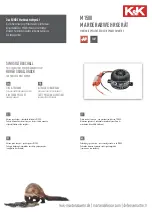
ES
FR
EN
IT
16
Madas Technical Manual
- 4|4.2b - REV. 0 of 1
st
Apr 2019
RG/2MBLZ
• Start the system and set the shut off as described in point 4.0;
• Slowly close the valve downstream of the regulator;
• Loosen and remove the cap (
26
);
• Use the 8 mm socket spanner (see fig. 1) to fully tighten the nut (
4
);
• Use the 8 mm socket spanner to press the adjustment nut (
4
) and increase the pressure P2, reading it on the pressure
gauge, up to the desired setting value;
• Without pressing further, slowly loosen the adjustment nut (
4
) until the pressure P2 begins to decrease, shown on the
pressure gauge;
• In this case, the relief valve is set to the desired value;
• Remove the socket spanner and close the cap (
26
).
6.4 - Adjusting the outlet pressure (P2)
The outlet pressure P2 (unless specifically requested) is factory-set with the regulator installed as indicated in 3.4 and with
the adjustment screw (
1
) set approximately at the minimum setting value. The safety shut offs/relief valve are set accordingly;
If the regulator is installed in different positions, check and reset the outlet pressure P2, and consequently the devices
incorporated in the regulator;
Adjust the outlet pressure as follows:
• Unscrew the cap (
26
);
• Unscrew the adjustment screw (
1
) and set it to the minimum setting allowed (threaded end of the top cover (
25
));
• Start the system or make sure there is a minimum flow downstream of the regulator;
• To increase the pressure calibration downstream of the regulator, tighten the adjustment screw (
1
) to the desired value.
Perform the reading with a calibrated pressure gauge, installed downstream of the regulator to at least 5 DN (see examples
in 3.4);
• Screw the cap (
26
) back on and if necessary, seal it in that position using the appropriate seal holes (if any);
• Use pressure outlets (
19
)on the device only for zero flow or very low flow measurements.
7.0 - RECOMMENDED PERIODIC CHECKS
• Use a suitable calibrated tool to ensure that the bolts are tightened as indicated in 3.2;
• Check the tightness of the flanged/threaded connections on the system;
• Check the tightness and operation of the regulator/shut off/relief valve;
The final user or installer is responsible for defining the frequency of these checks based on the severity of the service conditions.
7.1 - CHECK THAT THE MAXIMUM PRESSURE SHUT OFF VALVE IS WORKING (OPSO)
Reset the shut off device and close the valve downstream of the regulator;
Method 1:
1. Loosen and remove caps (
26
) and (
11
);
2. Use the same tool (shown in fig. 1) to press the nut (
4
) and slowly increase the downstream pressure until the device
is triggered;
3. Tighten the caps back to their original position and repeat the P2 setting steps (6.4);
Method 2:
1. Alternatively, use an auxiliary gas pressure to slowly increase the downstream pressure until the device is triggered
(so as to avoid having to set the P2 again).
















































